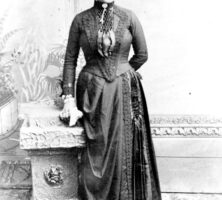Amanda America Dickson, the daughter of an enslaved woman and her enslaver, became one of the wealthiest Black women in nineteenth-century America.
She was born on November 20 or 21, 1849, on the Hancock County plantation of her father, the famous white agricultural reformer, David Dickson (1809-85). Her birth was the result of the rape of her enslaved mother, Julia Frances Lewis Dickson, when Julia was twelve years old. At the time, David Dickson was forty and the wealthiest planter in the county. Amanda America Dickson spent her childhood and adolescence in the house of her white grandmother and enslaver, Elizabeth Sholars Dickson, where she learned to read and write and play the piano—the survival skills of a young lady but not ordinarily the opportunities of a enslaved child. According to the Dickson family oral history, David Dickson doted on Amanda, and Julia quite openly became his concubine and housekeeper.

In 1865 or 1866 Dickson married her white first cousin, Charles Eubanks, a recently returned Civil War (1861-65) veteran. The union produced two sons: Julian Henry (1866-1937), who married Eva Walton, the daughter of Isabella and George Walton of Augusta; and Charles Green (1870-ca. 1900), who married Kate Holsey, the daughter of Harriet and Bishop Lucius Holsey of Augusta. Dickson left Eubanks in 1870 and with her sons returned to her father’s plantation. At that time she and her children took the last name of Dickson.
From 1876 to 1878 she left the plantation to attend the Normal School of Atlanta University. In the winter of 1885 David Dickson died, leaving the bulk of his estate to Amanda Dickson and subsequently to her children after her death. Executors appraised the estate, which included 17,000 acres of land in Hancock and Washington counties, at $309,000. In his will David Dickson stated that the administration of his estate was to be left to the sound judgment and unlimited discretion of Amanda Dickson without interference from any quarter, including any husband she might have. A host of David Dickson’s white relatives contested the will, but the superior court of Hancock County ruled in favor of Amanda Dickson in November 1885. The disgruntled relatives then appealed to the Georgia Supreme Court, which upheld the lower court decision in 1887. The higher court stated that the “rights of each race are controlled and governed by the same enactments or principles of law”—in other words, whatever rights and privileges belonged to a bastard white child belonged to a mixed-race child as well.
Before the supreme court decision, Dickson purchased a large house at 452 Telfair Street, in the wealthiest section of the then-integrated city of Augusta. By the time the courts settled the Dickson will case, she had firmly ensconced herself in this new home and decorated it with Brussels carpets, oil paintings, a walnut dining room table and chairs, and books. While white Georgians were establishing segregation as the ruling social order in the public sphere, members of the Dickson family went about their private lives.
In 1892 Dickson married Nathan Toomer of Perry. Toomer was born in 1839 in Chatham County, North Carolina, and enslaved by Richard Pilkinson. As a child Toomer was purchased by John Toomer, who moved to Houston County, Georgia, in the 1850s. Upon John Toomer’s death in 1859, his brother Colonel Henry Toomer purchased Nathan’s mother, Kit, and seven of her children from the estate. As Henry Toomer’s personal assistant, Nathan Toomer learned the manner of the white upper class. Toomer and Dickson’s marriage lasted until her death on June 11, 1893, of neurasthenia, or nervous exhaustion. Shortly thereafter Nathan Toomer married Nina Pinchback. The son of this marriage was Jean Toomer, the author of the novel Cane (1923).
Amanda America Dickson’s life reflected the power of family and class to erode the boundaries of race in the nineteenth-century South.






